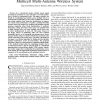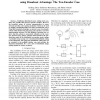54 search results - page 10 / 11 » Energy Benefit of Network Coding for Multiple Unicast in Wir... |
MOBICOM
2009
ACM
14 years 16 days ago
2009
ACM
Intended for network-wide dissemination of commands, configurations and code binaries, flooding has been investigated extensively in wireless networks. However, little work has ...
AINA
2007
IEEE
14 years 12 days ago
2007
IEEE
Nodes in sensor fields and in autonomous swarms of mobile robots need to communicate; this usually requires individual nodes to either consume a significant amount of energy, ca...
TWC
2008
13 years 5 months ago
2008
This paper considers a multi-hop network in which relay nodes cooperate to minimize the total energy consumed in transmitting a (unicast) packet from a source to a destination. We...
TWC
2010
13 years 22 days ago
2010
In a conventional wireless cellular system, signal processing is performed on a per-cell basis; out-of-cell interference is treated as background noise. This paper considers the be...
CORR
2010
Springer
13 years 6 months ago
2010
Springer
Abstract-- Traditional distributed source coding rarely considers the possible link between separate encoders. However, the broadcast nature of wireless communication in sensor net...


